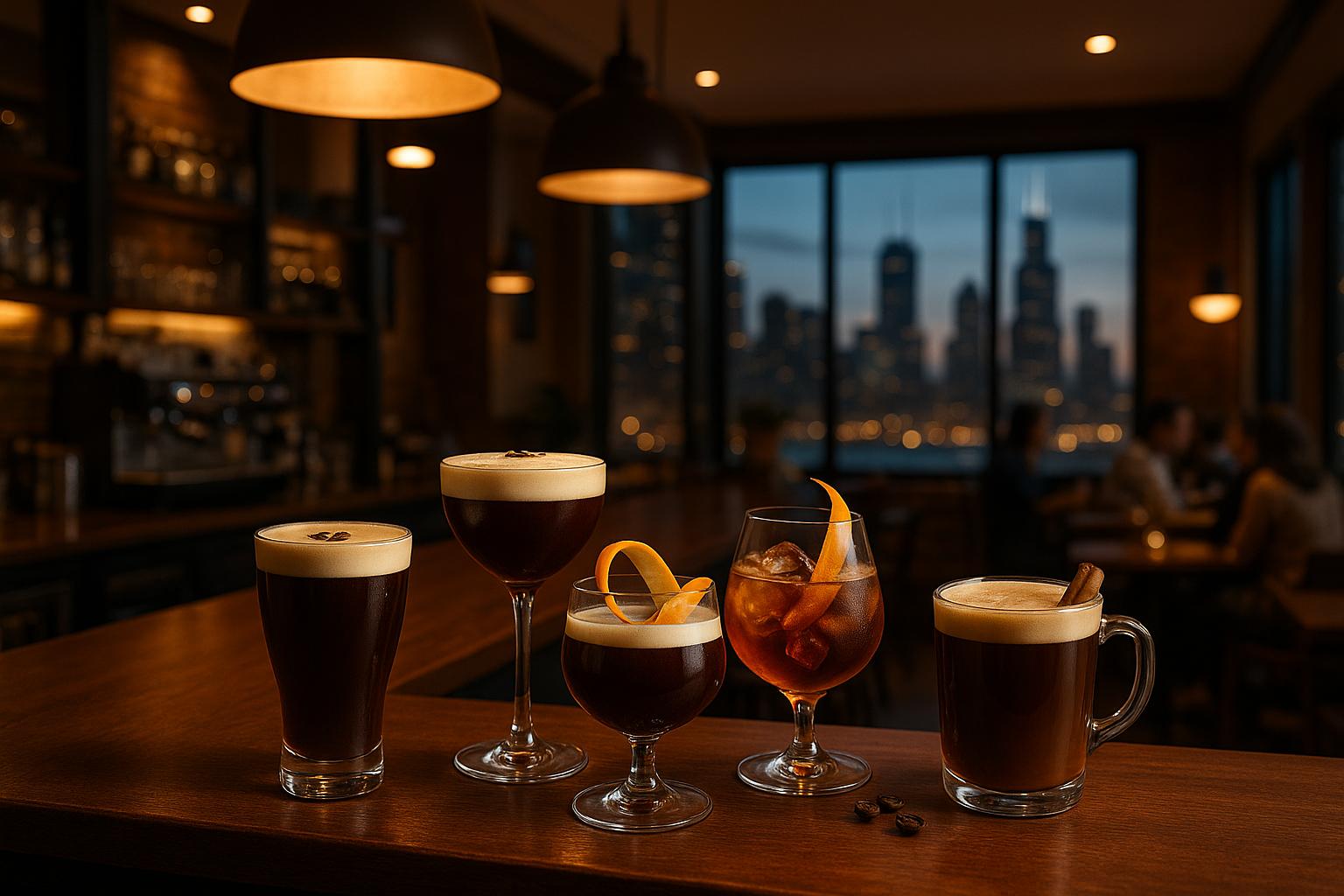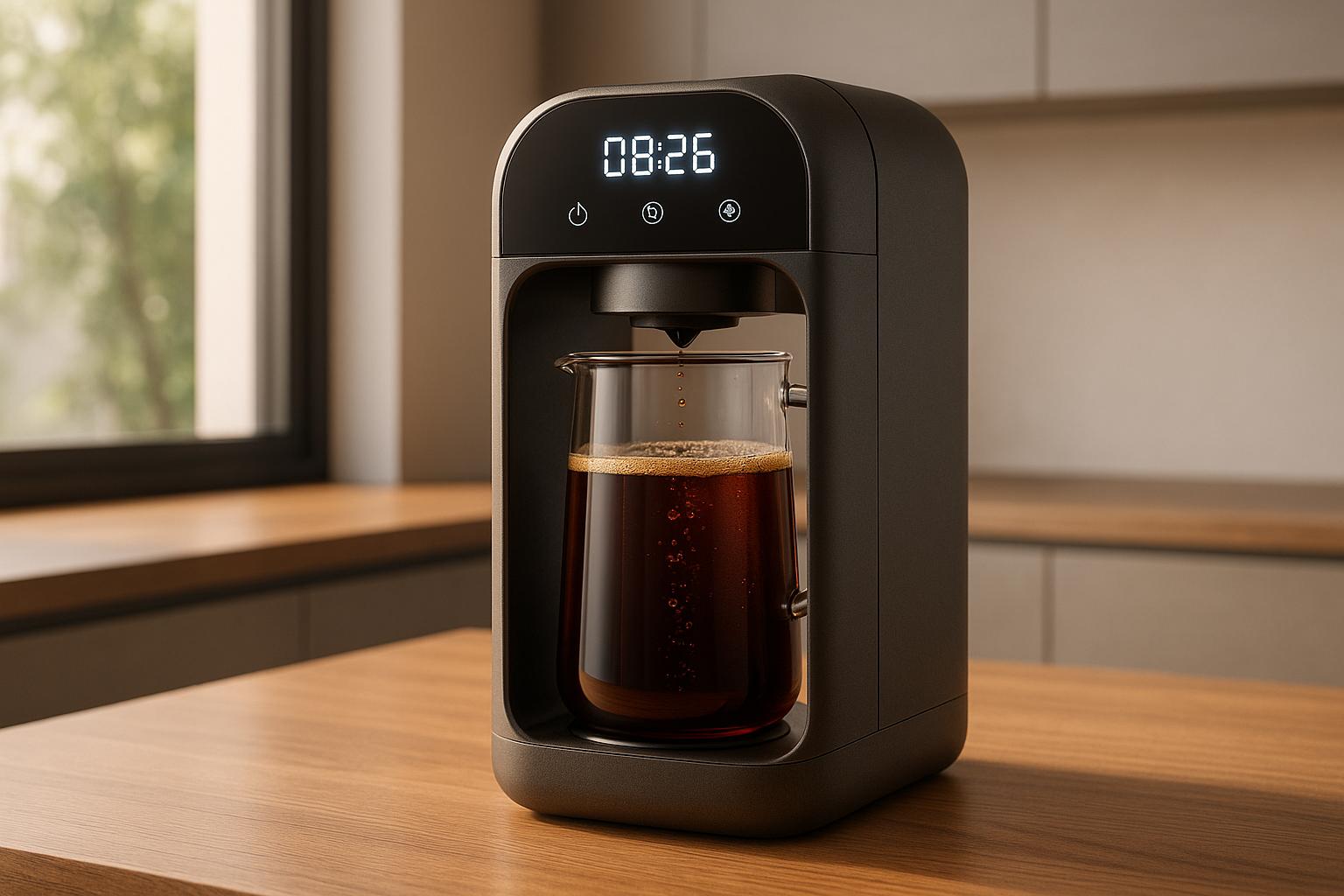W. F. McLaughlin & Co., established in 1852, was a key player in shaping Chicago's coffee industry. Known for its XXXX and Manor House brands, the company introduced pre-roasted, packaged coffee to U.S. consumers, offering consistent quality and convenience. By sourcing beans directly from Brazilian plantations and leveraging the expanding railroad network, McLaughlin grew into one of the largest coffee roasters in the country. Though it faced challenges in the 20th century, including competition from larger corporations, its impact on Chicago's coffee culture endures. Today, its legacy lives on in the city's vibrant coffee scene, marked by independent roasters and cafés prioritizing quality and accessibility.
The History of Coffee
W. F. McLaughlin & Co. Growth and Business Methods
W. F. McLaughlin & Co. turned a local Chicago coffee business into a trailblazer in the American coffee industry. By rethinking production, branding, and distribution, the company reshaped how coffee was consumed in the United States. Their strategy relied on three key innovations that set them apart.
Branded Coffee Products
In 1881, McLaughlin introduced the "XXXX" brand, one of the first pre-roasted coffee products on the market. At the time, most competitors sold raw coffee beans, leaving customers to roast them at home - a process prone to inconsistency. The XXXX brand changed the game by offering ready-to-use coffee with a dependable flavor and quality. This convenience quickly made it a household favorite.
The company also launched the Manor House coffee brand, which became so iconic that many simply referred to the company as "McLaughlin's Manor House Coffee." Dr. Castle McLaughlin, a descendant of the founder and a curator at Harvard's Peabody Museum, explained:
The larger company, W.F. McLaughlin and Co., was generally known to the public as McLaughlin's Manor House Coffee. [1]
By focusing on branded, pre-roasted coffee, McLaughlin not only provided convenience but also ensured consistent quality, which became a hallmark of their products.
Direct Coffee Sourcing and Quality Control
McLaughlin took a bold step by cutting out middlemen and sourcing coffee directly from plantations. In the late 19th century, the company owned coffee plantations in Brazil, particularly in Santos and Rio de Janeiro. This direct sourcing model allowed them to oversee the quality of their coffee from the ground up, ensuring a superior product for their customers.
An 1892 trade card highlighted this approach:
We buy all our XXXX Coffee from the coffee planters direct, thereby saving the importers, jobbers and commission men's profits. We give all this saving to the consumer, and say without any fear of contradiction that we are putting up coffee from 5 to 10 cents a pound finer quality than any other package or loose coffee on the market. [1]
This approach not only delivered better coffee but also kept prices competitive. A 1906 advertisement emphasized this value:
Tastes Good - Always. You get the extra good quality in this coffee because it is imported direct and sold direct to retail dealers by W. F. McLaughlin & Co., the largest exclusive coffee roasters in the world. [1]
By controlling the supply chain, McLaughlin ensured that quality and affordability remained central to their brand.
Railroad Expansion and Distribution
The rise of the transcontinental railroad played a pivotal role in McLaughlin's growth. While XXXX Coffee initially found success in Chicago, the expanded rail network allowed the company to distribute its pre-roasted, pre-packaged coffee far beyond the Midwest. Dr. Castle McLaughlin noted:
The brand's larger success "was really predicated on the expansion of markets made possible by the transcontinental railroad." [1]
This transportation breakthrough enabled the company to maintain the freshness and quality of its products while reaching new markets. As McLaughlin's coffee became available nationwide, its customer base and sales soared. By leveraging this network, the company grew to become the second-largest coffee roaster in the United States, second only to Arbuckles [1].
Through bold branding, direct sourcing, and efficient distribution, W. F. McLaughlin & Co. redefined the coffee industry while building a reputation for quality and reliability.
Effects on Chicago's Coffee Culture
W. F. McLaughlin & Co. transformed Chicago's coffee culture in the 19th century by focusing on the needs of everyday consumers. By introducing pre-roasted and pre-packed coffee, the company made coffee more convenient and appealing to a broader audience. This shift not only changed how people consumed coffee but also positioned McLaughlin as a trailblazer in the industry. These advancements laid the groundwork for targeted marketing strategies and contributed significantly to Chicago's thriving coffee scene.
Marketing Methods and Customer Outreach
McLaughlin's marketing strategies were ahead of their time, turning the brand into a household name. One of the standout tactics was the use of collectible trade cards during the 1880s and 1890s. These cards featured a variety of engaging images, from animals to famous landmarks, which not only boosted brand recognition but also encouraged customer loyalty by making the cards collectible.
Another clever move was the branding of its "XXXX" coffee. Borrowing from brewing traditions, where more X's signified higher quality and strength, the name immediately communicated a sense of premium quality to Chicago's coffee drinkers. This branding strategy helped make high-quality coffee accessible to working-class families, further solidifying McLaughlin's reputation as a leader in the market[1][2].
Local Economic Impact
McLaughlin's business operations had a major impact on Chicago's economy, particularly in establishing the city as a significant hub for coffee processing. In 1894 alone, the company imported an impressive 227,935 bags of Brazilian coffee through New York, showcasing the scale of its operations[3]. These efforts helped elevate Chicago to become the second-largest coffee roasting center in the United States, just behind New York.
sbb-itb-1371159
Business Challenges, Decline, and Historical Impact
W. F. McLaughlin & Co., once a dominant name in the coffee industry, faced mounting challenges in the 20th century that ultimately led to its decline. The company's struggles mirrored a larger trend in American business, where family-owned enterprises found themselves outpaced by massive corporations with greater resources and national influence.
20th Century Business Obstacles
The shifting business landscape brought significant hurdles for McLaughlin. World War I created a major disruption when the company lost access to its coffee plantations in South America. This forced McLaughlin to pivot, narrowing its focus to regional markets in the U.S.[1]. Over time, competition from national brands like Maxwell House (owned by General Foods) and Folgers (owned by Procter & Gamble) intensified[1]. These corporate-backed rivals had access to enormous marketing budgets and expansive distribution networks, resources far beyond the reach of a family-run business[2].
The broader trend of corporate consolidation further compounded the challenge. In an era dominated by super-conglomerates, maintaining a foothold in the market required more than just a strong reputation and quality products.
"In the new age of the super-conglomerate, there was simply no chance of getting by on reputation alone."
- Made-in-Chicago Museum [1]
Company Sale and Business End
Unable to keep pace with these pressures, McLaughlin scaled back its operations. Once a national competitor that helped establish Chicago as a coffee processing hub, the company retreated to serving just four Midwestern states. Even in its reduced capacity, it struggled to compete with better-funded rivals.
"After that, the company concentrated on the regional market rather than competing nationally."
- Dr. Castle McLaughlin [1]
The end came in 1967, marked by two pivotal events. First, the death of Herbert P. McLaughlin, the company's chairman, signaled the conclusion of an era for the family business. Later that year, the National Dairy Products Corporation acquired what remained of W. F. McLaughlin & Co., closing the chapter on nearly a century of independent operation. This transition marked not only the company's end but also the lasting influence of a local enterprise on a national scale.
Historical Legacy
Despite its eventual decline, McLaughlin's contributions left a lasting mark on Chicago's coffee culture. The company's innovations in pre-roasted, pre-packed coffee helped establish Chicago as a hub for quality coffee production.
More than anything, McLaughlin's emphasis on quality and accessibility shaped the city's appreciation for great coffee - an influence still visible today in Chicago's thriving craft and independent coffee scene. The company's legacy lives on in every cup brewed with a focus on craftsmanship and flavor.
Chicago's Coffee Scene Today
W. F. McLaughlin & Co.'s commitment to bringing quality coffee to the masses laid the groundwork for Chicago's vibrant and ever-evolving coffee culture.
Current Chicago Coffee Culture
Today, Chicago's coffee scene thrives on a blend of quality, artistry, and inclusivity. The city is brimming with independent coffee shops, ranging from cutting-edge third-wave roasters to classic neighborhood cafés. Many of these local roasters focus on ethically sourced beans and meticulous roasting techniques. Names like Intelligentsia and Metropolis Coffee Company have become synonymous with Chicago’s reputation as a coffee destination.
From the cozy corners of Lincoln Park to the energetic, laptop-friendly cafés in the Loop, coffee shops in Chicago act as more than just places to grab a drink - they're community hubs. The rise of specialty drinks, such as cold brew, which gained popularity in the 2010s, showcases the city’s knack for staying ahead of trends. Local roasters continually push boundaries with inventive brewing techniques, seasonal menus, and flavor profiles that reflect the rich diversity of Chicago's neighborhoods. For coffee lovers, this means endless opportunities to discover hidden gems across the city.
Finding the Best Coffee Shops in Chicago
With so many options and new spots popping up regularly, exploring Chicago’s coffee scene can feel overwhelming. That’s where BestCafeChicago.org comes in. This community-updated directory highlights standout cafés, from Wicker Park’s exceptional cold brews to River North’s inviting, work-friendly spaces.
The directory goes beyond just espresso, spotlighting cafés known for their unique offerings, welcoming atmospheres, and practical amenities like reliable Wi-Fi and cozy seating. This collaborative approach mirrors the inclusive spirit championed by early coffee pioneers like McLaughlin, reminding us that the joy of discovering great coffee is something to be shared by all.
Conclusion
W. F. McLaughlin & Co. played a pivotal role in shaping Chicago into one of America's key coffee hubs. By focusing on direct sourcing, branded products, and strict quality standards, the company set a foundation that still influences the coffee industry today. This legacy continues to resonate through Chicago's thriving coffee culture.
McLaughlin's approach not only defined a particular era but also paved the way for the diverse coffee scene we see today. By prioritizing quality and making coffee accessible to everyday people, the company helped establish Chicago as a cornerstone of the American coffee trade.
Although W. F. McLaughlin & Co. is no longer in operation, its impact is unmistakable. Independent roasters and neighborhood cafés across the city carry forward the same dedication to quality and accessibility, ensuring that the innovative spirit of early coffee pioneers lives on in modern establishments.
Today, McLaughlin’s pioneering influence still fuels Chicago’s dynamic coffee landscape. Whether you’re savoring a cold brew in Wicker Park or finding a cozy café in River North, Chicago’s coffee culture remains a vibrant mix of tradition and modern creativity. For a curated guide to the city’s best coffee spots, check out Best Coffee Shops in Chicago.
FAQs
What impact did W. F. McLaughlin & Co. have on Chicago's coffee culture?
W. F. McLaughlin & Co., established in 1852, holds the distinction of being one of Chicago's first coffee roasters, playing a pivotal role in the city's coffee heritage. By setting new standards in coffee roasting and distribution, the company made coffee a household essential for families and businesses across Chicago.
Their influence extended beyond coffee, helping shape Chicago's identity as a center for progress and commerce in the 19th century. Even today, their impact lives on, laying the groundwork for the vibrant café culture that defines the city’s coffee scene.
What innovations did W. F. McLaughlin & Co. bring to the coffee industry in Chicago and beyond?
W. F. McLaughlin & Co., established in 1852, changed the coffee game by pioneering mass production and introducing branding strategies that were ahead of their time. They were among the first to package coffee in a way that earned consumer trust while making their product instantly recognizable - turning coffee into more than just a commodity and emphasizing quality.
The company also made strides in coffee roasting, offering a range of blends, dark roasts, and even some of the earliest decaffeinated options. These efforts gave customers more choices and played a big role in turning Chicago into a key hub for coffee culture in the U.S. Their work set the bar for industry practices, leaving a lasting mark on how coffee is produced and enjoyed today.
What challenges led to the decline of W. F. McLaughlin & Co. in the 20th century?
W. F. McLaughlin & Co. encountered tough times during the 20th century as the coffee industry saw the rise of major players like General Foods. These large corporations had the advantage of vast resources and the ability to operate on a nationwide scale, leaving smaller, local firms like McLaughlin struggling to keep up.
On top of that, consumer tastes began to shift. Coffee drinkers started gravitating toward more personalized and artisanal options, making it harder for traditional companies like McLaughlin to stay relevant. This changing landscape played a significant role in the company's eventual decline.


